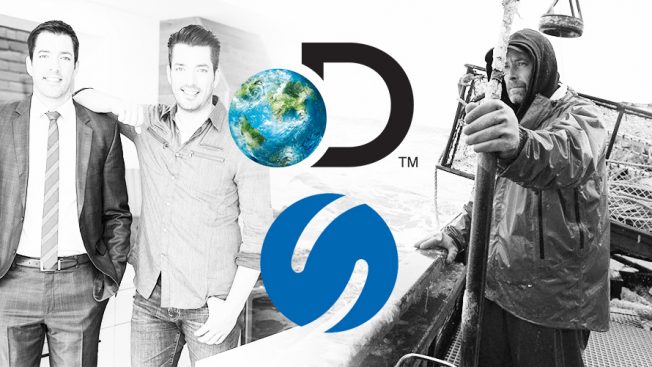Two weeks after Discovery Communications and Scripps Networks Interactive’s merger talks went public—and three and a half years after their initial negotiations collapsed—the companies are headed down the aisle, as Discovery announced today that it will officially acquire Scripps for $14.6 billion.
The combined company will control close to 20 percent of the country’s ad-supported cable and satellite viewership—and many of the cable networks watched most by women—and help create a host of new digital offerings for the linear-heavy portfolio.
The deal, which is expected to close next year, will be a cash-and-stock transaction valued at $14.6 billion, or $90 per share: $63 per share in cash; $27 per share in stock. Scripps shareholders will own 20 percent of Discovery, which as part of the deal will take on Scripps’ net debt of around $2.7 billion.
Discovery and Scripps’ merger will bring together Discovery’s networks like Discovery Channel, TLC, Investigation Discovery, Animal Planet, OWN and Eurosport, with Scripps’ offerings like HGTV, Food Network and Travel Channel. Together, they produce around 8,000 hours of programming each year and generate 7 billion short-video streams monthly.
Advertisers, especially those targeting female audiences, will likely find themselves working frequently with the combined company, which will boast five of the top female networks in ad-supported cable (including HGTV and ID), with more than a 20 percent share of women watching primetime cable in the U.S.
Companies say the merger will help Scripps’ brands and shows reach an international audience, while Discovery will boost its global female networks with content from HGTV, Food Network and other Scripps brands. Scripps Lifestyle Studios will become “a key component of Discovery’s content engine,” the companies said, which will drive increases in data-driven ad sales and branded entertainment.
The merger makes sense for all the reasons Adweek spelled out two weeks ago: both companies are seeing ratings and advertising growth, the combined company will give them more leverage with cable companies during carriage negotiations (particularly important given the shift to skinny bundles), their portfolios complement each other well with minimal overlap, it will boost Scripps’ global expansion and also offers big OTT opportunities.
However, there are also some red flags, including the glaring lack of domestic sports content (although Discovery is a formidable international sports presence with Eurosport), which has become an essential element in today’s landscape. And despite Discovery’s efforts to expand its digital footprint with a $100 million investment in Group Nine Media last October, their companies are currently too linear-dependent, which will put them at a disadvantage if audiences continue to erode.
Discovery and Scripps addressed that digital criticism in their announcement, noting that the deal adds scale for new digital distribution partners, and suggesting that it will lead to new mobile, OTT and direct-to-consumer offerings.
“This is an exciting new chapter for Discovery. Scripps is one of the best run media companies in the world with terrific assets, strong brands and popular talent and formats. Our business is about great storytelling, authentic characters and passionate super fans. We believe that by coming together with Scripps, we will create a stronger, more flexible and more dynamic media company with a global content engine that can be fully optimized and monetized across our combined networks, products and services in every country around the world,” said David Zaslav, president and CEO for Discovery Communications, in a statement.
Added Kenneth W. Lowe, Scripps chairman, president and CEO, in a statement, “This agreement with Discovery presents an unmatched opportunity for Scripps to grow its leading lifestyle brands across the world and on new and emerging channels including short-form, direct-to-consumer and streaming platforms.”
Discovery said the deal will bring about $350 million in cost savings.
This is the second time that Discovery and Scripps had discussed joining forces. They previously held talks in late 2013, but by January 2014, Scripps had pulled out. Viacom had also been in negotiations with Scripps this month, but that company backed away from talks last week.








